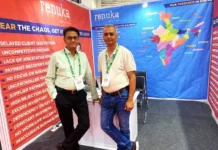The All India Plastics Manufacturers’ Association (AIPMA) was invited by the ministry of finance to a two-hour meeting chaired by finance minister Nirmala Sitharaman. The meeting was attended by minister of state for finance Pankaj Choudhary, finance secretary M Nagaraju, secretary for economic affairs Ajay Seth, chief economic advisor V Anantha Nageswaran, MSME secretary CL Das, and representatives from nine other industry associations.
The agenda of the meeting focused on understanding the growth trajectory of MSMEs across various sectors. AIPMA’s recommendations were presented by governing council chairman Arvind Mehta, who served as the key speaker, supported by president Manoj R. Shah. The association’s inputs were well-received and positively acknowledged by several other associations present during the discussion.
During the pre-budget consultation meeting. Mehta and Shah presented a strategic roadmap to enhance the competitiveness of India’s plastic sector on a global scale.
Mehta said MSMEs in the plastic sector play a significant role in augmenting Investment, productivity, quality, employment, and exports along with import substitution and economic growth. “The plastic processing sector, predominantly comprising MSMEs (around 85%), is present across the country, It employs more than 4 million people and constitutes 50,000 processing units. The government should promote the domestic plastic finished goods industry. India should develop a comprehensive action plan to boost exports to make India the next global plastic product -production hub.”
India has a significant opportunity to enhance its exports of plastic products, they said. The country’s value-added plastic products are predominantly exported to regions such as Europe, North America, WANA, Africa, South Asia, and Latin America (LAC), reflecting their global demand.
Mehta said that China’s export of plastic finished goods is currently 25 times higher than India’s. He emphasized the vast potential for India to expand its exports of finished plastic products. To achieve this, AIPMA proposed production-linked incentives (PLI) to support manufacturers in scaling up operations and allocating funds for establishing warehouses at strategic locations to facilitate logistics for exports. These measures could boost India’s plastic exports by four times within the next three years, creating substantial employment opportunities, substituting imports, and contributing to India’s economic growth.
AIPMA also recommended several reforms to support the MSME plastic sector, including increasing customs duty on plastic finished goods to 20% to safeguard domestic manufacturers and avoiding the imposition of anti-dumping duties on critical inputs such as PVC paste resin, PVC suspension resin, titanium dioxide, low-density polyethylene (LDPE), plastic processing machinery and similar products.
India’s plastic recycling sector is growing rapidly, with the country now recycling 60% of its plastic waste, driven by the Extended Producer Responsibility (EPR) mandate. However, the sector remains in its early stages and requires additional government support.
AIPMA’s key proposals
*Reduce GST to NIL for plastic waste for recycling.
* Reduce GST from 18% to 5 % on recycled plastic granules only on the conversion cost of recycled granules.
*Reduce GST to NIL on recycling machinery to increase recycling companies in india.
*20 % subsidy across India for buying capital equipment for recycling.
To foster ease of doing business and align with the ‘Make in India’ initiative with ‘Zero effect & Zero defect,’ AIPMA called for the establishment of a technical upgradation fund (TUF) with an allocation of Rs 2,500 crore over 5 years for the plastic processing sector in line with textile sector.
PLUG & PLAY
Given that MSMEs account for 85% of the plastic processing sector, Mehta stressed the need for ready-to-use facilities called PLUG & PLAY including land, buildings, power, water, sewage, and road connectivity, along with pre-approved clearances to help MSMEs start operations seamlessly. This should be on the long lease as funds required for MSME’s will be less and one can start production immediately and it can be a game changer for the Indian Plastic Industry.
Recognizing the need for a skilled workforce in the rapidly expanding plastic sector, Mehta highlighted the efforts of the Arvind Mehta Technology and Entrepreneurship Centre of Excellence (AMTEC) in Mumbai. This initiative bridges the skill gap and creates employment opportunities for economically weaker students. Mr. Mehta urged the Government of India to allocate funds to support such skill development programs, which are critical to fostering growth in the sector.
AIPMA’s proposals aim to empower MSMEs, strengthen India’s position in the global plastics market, and drive sustainable economic growth. The association looks forward to collaborative efforts with the government to realize the sector’s immense potential.
AIPMA is honored to be invited by the Ministry of Finance, Government of India, to participate in the Pre-Budget Consultation discussions. We are committed to aligning with government policies and procedures to promote sustainability and elevate the Indian plastic industry to a globally competitive position.











